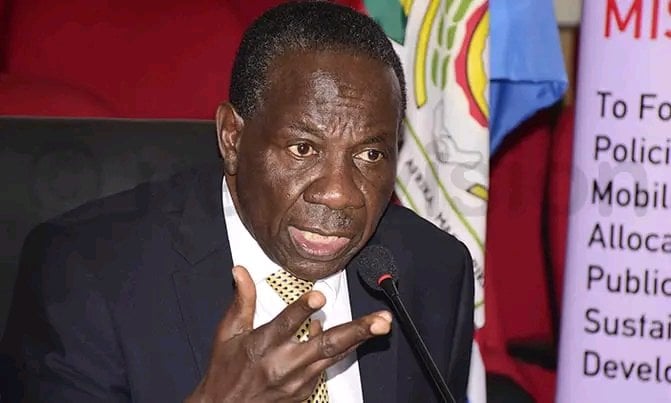Uganda’s economic outlook remains dim as the shilling continues to slide against global currencies, precipitating the risk of debt distress for a country with a voracious borrowing appetite.
During a recent budget conference, Finance Minister Matia Kasaija spoke candidly about the threat of creeping debt.
“Almost every Monday when [the] Cabinet sits, there are new demands for supplementary budgets. Now I have learnt to keep quiet even when the President says Kasaija find money for this…I say yes but I don’t do anything because there is no money and I will not borrow indefinitely,” he disclosed.
Ms Catherine Kijjagulwe, the head of trading at Absa Bank Uganda, told Monitor: “ We have seen the shilling opening the year 2024 at levels of 3775/3785. As at Friday February 23, it’s trading at levels of 3935/3945, about a four percent depreciation from where it opened the year.”
She added: “A number of factors have contributed to the weakening of the shilling though it accelerated in the past two weeks when we had the infrastructure bond in Kenya. We saw some offshores coming to purchase dollars with the shillings that they had or selling part of their holdings in government securities converting it dollars then going to invest in the infrastructure bond in Kenya that was interest free and cleared at 18.4 percent. So that led to a significant depreciation in the shilling.”
Ms Kijjagulwe further attributed the depreciation of the shilling to the ripples in the early stage of the financial year.
“We are still at the start of the year, so some NGOs are receiving their funding […] this has also affected the supply side in terms of dollar inflows into the market. Looking ahead, usually between now and June is the dividend period,” she said.
She added: “We may continue to see cycles of demand from some of our corporates. However, we are also positive that as the economy picks up and then offshores come into the Ugandan market, we may see the shilling consolidate a bit and recoup some of its losses in the coming days.”
Hope springs eternal
She is optimistic that the shilling could gradually emerge from the volatility, especially “as government spends, paying suppliers, then some of those who import goods will also have the liquidity to purchase some dollars.”
Ms Kijjagulwe is also confident that “the supply side is also well covered” not least because “we will see the commodity exporters being able to sell dollars if the coffee season comes through around March, to be able to match off some of this demand.”
Dr Madina Guloba, who is a senior research fellow at the Economic Policy Research Centre (EPRC), at Makerere University, shares similar views with Ms Kijjagulwe.
“This quarter in particular compared to last year, the performance is almost similar. So what we have to understand is what happens in these few months, January to March, that makes the exchange rate the way it is because the behaviour is a bit similar,” she said.
Dr Guloba attributed the shilling’s depreciation to the weak position in regard to the country’s balance of payments.
“Our export prices have actually plummeted. We see the coffee price is not good right now in the foreign markets. We have cotton which is not performing well, tea has misbehaved, which makes our balance of payment so bad,” she said.
Mr John Kakungulu Walugembe, an economist, sees Uganda’s major problem as being the fact “that we import a lot and don’t export enough”, creating a trade deficit.
“By the end of 2023 it,” he said of the deficit, “was about $269.87million. Our current account deficit, a complex word for the same thing, is about 9.7 percent of our Gross Domestic Product. It is like a household that sells one banana but buys two bunches of matooke everyday and buys two kilogrammes of meat.”
What depreciation means
Mr Amos Sanday, a researcher at EPRC, told Sunday Monitor that “ a depreciating shilling makes imports expensive and the importers will pass that cost on to the common person in terms of higher prices.”
He added: “If the shilling depreciates by five percent, assuming you bought one shilling then you would have to pay five shillings more, so that increases your debt burden in net terms. In macro terms, if you were a country that borrowed Shs100b, you would have to pay Shs5b more in debt due to exchange rate fluctuations. But if you are also a private business person and you borrowed in dollars you would pay more. It increases the cost of borrowing to the business community and also on the macro-level it increases the country’s debt burden.”
Consequently, opined Mr Walugembe, certain products—be they final, intermediary or raw materials—will be more expensive. Thankfully, he added: “In Uganda, inflation is driven by the price of food and good weather, so definitely we have a negative impact on overall inflation at the level of consumption. If you consume imported things, then definitely its going to be expensive.”
Mr Walugembe said at the moment Western Central Banks are raising interest rates to deal with inflation and portfolio investors are opting to invest in such markets.
“It is a more secure investment environment. So most of those portfolio investors are pulling their capital out of the [Ugandan] market. This is having a negative impact on the strength of the shilling,” he observed.
Geopolitical picture
The ruin left by the Covid-19 pandemic has pushed Uganda to breach borrowing thresholds as the principal and interest for its debt in this year’s budget rose exponentially to Shs17 trillion—an astronomical figure, which will likely erode the gains made by government-generated revenue.
This has affected Uganda’s overall credit rating by Fitch, an American credit rating agency. The rating stands at B+, with a negative outlook. The negative outlook reflects Uganda’s weak external liquidity position and challenges to its access of external concessional financing and grants related to concerns about democracy, human rights and corruption. This could lead to borrowing at higher interest rates and few options of lenders willing to provide credit.
But with the global economy roiled by the conflicts in Gaza and Ukraine and the taps of funding from cheaper long-term concessional loans drying up, Uganda continues to borrow in a futile attempt to extricate itself from emerging budget rabbit holes.
“Most of our debt is denominated in dollars. It means that we need more money to pay our existing debt. We run a risk of debt distress. Not only shall we find it difficult to service our debt, but it means that we shall have to contract new debt, unless we can cut down our expenditure significantly which is unlikely,” said Mr Walugembe.
Mr Walugembe said a weak shilling is not entirely a bad thing. He noted that “it helps moderate our trade deficit” since it “discourages imports [and] at the same time […] makes our exports more competitive.”
Austerity measures
In June 2023, the government rolled out austerity measures, including a freeze on the creation of new units, the reduction on domestic borrowing and the merger of government agencies, which it estimates will save about Shs1 trillion.
The government has, however, already reneged on its promise to scale back on domestic borrowing. In the last financial quarter, it borrowed Shs3 trillion from domestic banks, which will likely crowd out the private sector from the credit market.
Dr Guloba said because of constrained borrowing from development partners, “government is increasingly looking out for domestic commercial banks to finance its business.” This, she further noted, “makes the dollar a bit more expensive because of the demand within the market and there are more shillings on the market because the government is paying back its domestic debt.”
The Finance ministry’s report released on January 31 attributed the depreciation of the shilling to the rising demand of the dollar in the sectors of manufacturing, oil, telecom and energy firms.
It also indicated a deficit in domestic revenue collections in January 2024. This amounted to Shs2.2 trillion lower than the month’s target of Shs2.3 trillion. The shortfall was mainly on the account of lower than anticipated collections of Value Added Tax (VAT), excise duty and taxes on international trade.
According to the central bank’s February 2024 monetary policy statement, “instability in the Middle East is creating new supply chain disruptions and the threat of higher oil prices. In addition, the risk of heightened volatility in the global financial and foreign exchange markets remains, which could spill over into the domestic foreign exchange market.”
Dr Michael Atingi-Ego, the central bank deputy governor, further noted: “Furthermore, renewed global supply disruptions could reverse global disinflation and delay monetary easing in advanced economies, leading to continued portfolio outflows and further depreciation pressure on the Ugandan shilling.”

Auditor General John Muwanga. PHOTO/ FILE
Dark road ahead
However, on a brighter note, in December 2023, Uganda traded at a surplus of $22.30 million with the rest of the EAC partner states, a shift from a deficit of $22.67 million recorded the previous month.
The expanded scale of borrowing was predicated on the expectation that the government could generate $10 billion in the oil sector during the Final Investment Decision (FID). But the investment outlook remains gloomy amid flak from the West towards financing fossil fuel projects, which “may pose a threat to bio-diversity” in favour of clean and renewable energy—a claim, which the Ugandan government says is flawed as Western countries contribute the largest amount of carbon emissions globally and have failed to honour reparations to poor countries especially those in sub-Saharan Africa.
Left with a few options to sustain its budget, the Ugandan government continues to expand its borrowing portfolio, which will likely peak at Shs100 trillion. This as the government plans to borrow Shs13 trillion this year to plug the deficit in the 2024/2025 budget.
Auditor General John Muwanga, in his 2022/ 2023 audit report, warned: “The increasing trend in the government debt position reduces the available resources for both funding development projects and service delivery as huge resources will be directed towards debt repayment.”
At the domestic level, the Covid pandemic heightened borrowing and led to the collapse of private firms and Small and Medium Enterprises (SMEs). To date, properties, which had been staked as collateral to secure credit at commercial banks are being foreclosed and sold under the hammer.
What they say
Indeed, the recent shilling movements against the US dollar have been mainly driven by external factors and, if sustained, could lead to higher inflation despite easing global inflation,” Dr Michael Atingi-Ego, the central bank deputy governor.
The increasing trend in the government debt position reduces the available resources for both funding development projects and service delivery as huge resources will be directed towards debt repayment,’’ Auditor General John Muwanga.
